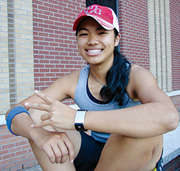Twisting Her Way Out
Winner of OutSmart’s Coming Out Essay Contest, Melanie Pang finds coming out an ongoing process.
By Melanie Pang

To celebrate National Coming Out Day,
OutSmart collaborated with the University of Houston students, asking them last month to share their coming out stories. Several students submitted entries, but OutSmart staff agreed that c’s story stood out as exceptional.
A resident of Missouri City, Melanie, 22, is a junior at UH, majoring in journalism with a minor in GLBT studies. For the past two years she has served as president of GLOBAL, the campus’ social, political, and support organization for the gay, lesbian, bisexual, and transgender community and its supporters.
Here is a cross that I willingly bear, this paradox in which being with her sets me free and binds me all at once. Be myself, but not the self people in Montrose see on a Saturday night, not the self that feels free. Show the other self, the other you, the accepted you, the half-truth. Though no one is physically holding me captive, it can often feel like part of my life is in a chest with the key placed inside the lock, ready to be turned at any moment.
At times, I feel as though I come out of closets constantly. In some ways I can “out” myself at will as someone, for example, who has unconventional views of religion, without breaking a sweat. But when I told my sister that I had been dating another girl for over a year, I was nothing but sweaty palms and dry throat as I bypassed breaking a sweat and went right to pouring tears.
My sister’s response: “This is just a phase, right?” Eventually, she reassured me of her love and support. That was only one of many “coming out” episodes. The choice to come out comes up daily. It is ongoing. The choice to come out belongs to the individual, and it’s a course that becomes even trickier knowing I’m a work in progress, that my sexuality is fluid.
I’ve been told before that I don’t “look gay.” The woman at the office desk who made the observation referred to the fact that I don’t appear to be “butch, like other lesbians.” After a casual conversation on GLBT diversity, I reassured her that there is no way to know a person’s orientation from appearances, and she seemed to be enlightened—not fully accepting, but understanding, which I took to be a baby-step, but a step forward nonetheless.
On a plane to San Francisco this past summer, I sat next to a lovely young woman and her baby daughter. The woman asked me, “So, what are you going to California for?” I froze for a split second and then remembered that I would probably never see this woman again, so what could it hurt? Sure, I may have to sit with her for the duration of the flight, but there was nothing I had to lose by being honest.
“I’m going to San Francisco for Pride weekend,” I said.
I wish I could say that I am prepared or willing to find out what it would be like to come out to my mother, but as for now, I’m content with trying to avoid a heart attack and breaking what was once a solid mother-daughter relationship. Part of me wonders, Would she be more angry knowing that I’ve kept this from her all this time? Has she already figured it out? Still, my heart aches to tell her, to let her know she can be proud of her daughter for more than who she loves. I cannot fathom breaking my own mother’s heart while completing my own.
As the youngest of four children, I was teased relentlessly by my two brothers about my fear of the dark. Too small to wrestle and too young to take offense to sarcasm, I would often find myself twisting, pulling, and banging on doors that had been barricaded by a piece of furniture or held shut by the weight and twisted wrist of a snickering older brother. My hands burned from clutching the doorknob; my pride hurt from the laughter at my nearly vain attempts to get out of the scary unknown.
On the verge of tears and desperate to get out, I would often lie in wait until busting the door open once they had dropped their guard or be ready to defend myself against the Boogey Man or a ghost. My siblings didn’t have a code word, like “uncle” or “mercy,” but even then I probably would have been too stubborn to use it. I was determined to get out of that closet, both figuratively and metaphorically. No longer afraid of the dark, I came out—on my own terms and not because anybody let me.










